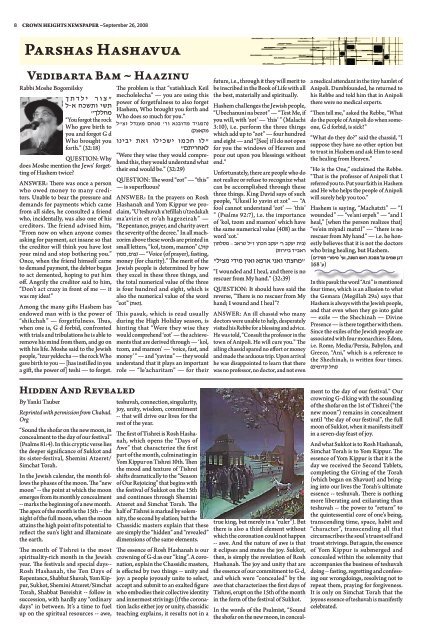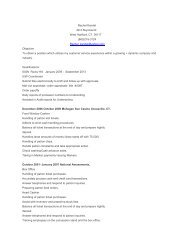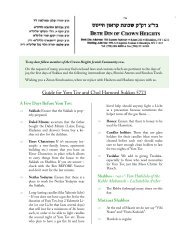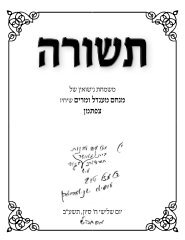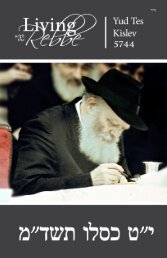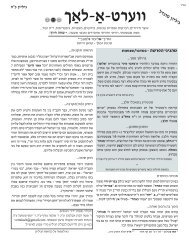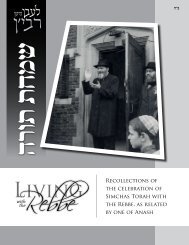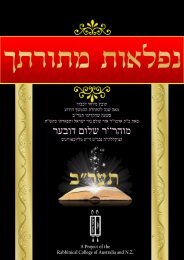THE REBBE'S OWN UNITED NATIONS - COLlive.com
THE REBBE'S OWN UNITED NATIONS - COLlive.com
THE REBBE'S OWN UNITED NATIONS - COLlive.com
Create successful ePaper yourself
Turn your PDF publications into a flip-book with our unique Google optimized e-Paper software.
8 CR<strong>OWN</strong> HEIGHTS Newspaper ~September 26, 2008<br />
Parshas Hashavua<br />
Vedibarta Bam ~ Haazinu<br />
Rabbi Moshe Bogomilsky<br />
"צור ילדתך<br />
תשי ותשכח א-ל<br />
מחללך"<br />
“You forgot the rock<br />
Who gave birth to<br />
you and forgot G d<br />
Who brought you<br />
forth.” (32:18)<br />
QUESTION: Why<br />
does Moshe mention the Jews’ forgetting<br />
of Hashem twice?<br />
ANSWER: There was once a person<br />
who owed money to many creditors.<br />
Unable to bear the pressure and<br />
demands for payments which came<br />
from all sides, he consulted a friend<br />
who, incidentally, was also one of his<br />
creditors. The friend advised him,<br />
“From now on when anyone <strong>com</strong>es<br />
asking for payment, act insane so that<br />
the creditor will think you have lost<br />
your mind and stop bothering you.”<br />
Once, when the friend himself came<br />
to demand payment, the debtor began<br />
to act demented, hoping to put him<br />
off. Angrily the creditor said to him,<br />
“Don’t act crazy in front of me — it<br />
was my idea!”<br />
Among the many gifts Hashem has<br />
endowed man with is the power of<br />
“shikchah” — forgetfulness. Thus,<br />
when one is, G d forbid, confronted<br />
with trials and tribulations he is able to<br />
remove his mind from them, and go on<br />
with his life. Moshe said to the Jewish<br />
people, “tzur yeldecha — the rock Who<br />
gave birth to you — [has instilled in you<br />
a gift, the power of] teshi — to forget.<br />
The problem is that “vatishkach Keil<br />
mecholelecha” — you are using this<br />
power of forgetfulness to also forget<br />
Hashem, Who brought you forth and<br />
Who does so much for you.”<br />
)המגיד מדובנא ור' מנחם מענדל זצ"ל<br />
מקאצק(<br />
"לו חכמו ישכילו זאת יבינו<br />
לאחריתם"<br />
“Were they wise they would <strong>com</strong>prehend<br />
this, they would understand what<br />
their end would be.” (32:29)<br />
QUESTION: The word “zot” — “this”<br />
— is superfluous?<br />
ANSWER: In the prayers on Rosh<br />
Hashanah and Yom Kippur we proclaim,<br />
“U’teshuvah u’tefillah u’tzedakah<br />
ma’avirin et ro’ah hagezeirah” —<br />
“Repentance, prayer, and charity avert<br />
the severity of the decree.” In all machzorim<br />
above these words are printed in<br />
קול,) mamon” small letters, “kol, tzom,<br />
fasting, “Voice (of prayer), — (צום, ממון<br />
money (for charity).” The merit of the<br />
Jewish people is determined by how<br />
they excel in these three things, and<br />
the total numerical value of the three<br />
is four hundred and eight, which is<br />
also the numerical value of the word<br />
.(זאת) “zot”<br />
This pasuk, which is read usually<br />
during the High Holiday season, is<br />
hinting that “Were they wise they<br />
would <strong>com</strong>prehend ‘zot’ — the achievements<br />
that are derived through — ‘kol,<br />
tzom, and mamon’ — ‘voice, fast, and<br />
money’ ” — and “yavinu” — they would<br />
understand that it plays an important<br />
role — “le’acharitam” — for their<br />
future, i.e., through it they will merit to<br />
be inscribed in the Book of Life with all<br />
the best, materially and spiritually.<br />
Hashem challenges the Jewish people,<br />
“Ubechanuni na bezot” — “Test Me, if<br />
you will, with ‘zot’ — ‘this’ ” (Malachi<br />
3:10), i.e. perform the three things<br />
which add up to “zot” — four hundred<br />
and eight — and “[See] if I do not open<br />
for you the windows of Heaven and<br />
pour out upon you blessings without<br />
end.”<br />
Unfortunately, there are people who do<br />
not realize or refuse to recognize what<br />
can be ac<strong>com</strong>plished through these<br />
three things. King David says of such<br />
people, “Ukesil lo yavin et zot” — “A<br />
fool cannot understand ‘zot’ — ‘this’<br />
” (Psalms 92:7), i.e. the importance<br />
of ‘kol, tzom and mamon’ which have<br />
the same numerical value (408) as the<br />
word ‘zot.’<br />
)בית יעקב ר' יעקב הכהן ז"ל טראב – מסלתון<br />
ראב"ד ביירות(<br />
"מחצתי ואני ארפא ואין מידי מציל"<br />
“I wounded and I heal, and there is no<br />
rescuer from My hand.” (32:39)<br />
QUESTION: It should have said the<br />
reverse, “There is no rescuer from My<br />
hand; I wound and I heal”?<br />
ANSWER: An ill chassid who many<br />
doctors were unable to help, desperately<br />
visited his Rebbe for a blessing and advice.<br />
He was told, “Consult the professor in the<br />
town of Anipoli. He will cure you.” The<br />
ailing chassid spared no effort or money<br />
and made the arduous trip. Upon arrival<br />
he was disappointed to learn that there<br />
was no professor, no doctor, and not even<br />
a medical attendant in the tiny hamlet of<br />
Anipoli. Dumbfounded, he returned to<br />
his Rebbe and told him that in Anipoli<br />
there were no medical experts.<br />
“Then tell me,” asked the Rebbe, “What<br />
do the people of Anipoli do when someone,<br />
G d forbid, is sick?”<br />
“What do they do?” said the chassid, “I<br />
suppose they have no other option but<br />
to trust in Hashem and ask Him to send<br />
the healing from Heaven.”<br />
“He is the One,” exclaimed the Rebbe.<br />
“That is the professor of Anipoli that I<br />
referred you to. Put your faith in Hashem<br />
and He who helps the people of Anipoli<br />
will surely help you too.”<br />
Hashem is saying, “Machatzti” — “I<br />
wounded” — “ve’ani erpeh” — “and I<br />
heal,” [when the person realizes that]<br />
“ve’ein miyadi matzil” — “there is no<br />
rescuer from My hand” — i.e. he honestly<br />
believes that it is not the doctors<br />
who bring healing, but Hashem.<br />
דגן שמים על מםכת ראש השנה, ועי' סיפורי חסידים)<br />
(ע' 168<br />
In this pasuk the word “Ani” is mentioned<br />
four times, which is an allusion to what<br />
the Gemara (Megillah 29a) says that<br />
Hashem is always with the Jewish people,<br />
and that even when they go into galut<br />
— exile — the Shechinah — Divine<br />
Presence — is there together with them.<br />
Since the exiles of the Jewish people are<br />
associated with four monarchies: Edom,<br />
i.e. Rome, Media/Persia, Babylon, and<br />
Greece, “Ani,” which is a reference to<br />
the Shechinah, is written four times.<br />
(נחל קדומים)<br />
Hidden And Revealed<br />
By Yanki Tauber<br />
Reprinted with permission from Chabad.<br />
Org<br />
“Sound the shofar on the new moon, in<br />
concealment to the day of our festival”<br />
(Psalms 81:4). In this cryptic verse lies<br />
the deeper significance of Sukkot and<br />
its sister-festival, Shemini Atzeret/<br />
Simchat Torah.<br />
In the Jewish calendar, the month follows<br />
the phases of the moon. The “new<br />
moon” -- the point at which the moon<br />
emerges from its monthly concealment<br />
-- marks the beginning of a new month.<br />
The apex of the month is the 15th -- the<br />
night of the full moon, when the moon<br />
attains the high point of its potential to<br />
reflect the sun’s light and illuminate<br />
the earth.<br />
The month of Tishrei is the most<br />
spirituality-rich month in the Jewish<br />
year. The festivals and special days--<br />
Rosh Hashanah, the Ten Days of<br />
Repentance, Shabbat Shuvah, Yom Kippur,<br />
Sukkot, Shemini Atzeret/Simchat<br />
Torah, Shabbat Bereishit -- follow in<br />
succession, with hardly any “ordinary<br />
days” in between. It’s a time to fuel<br />
up on the spiritual resources -- awe,<br />
teshuvah, connection, singularity,<br />
joy, unity, wisdom, <strong>com</strong>mitment<br />
-- that will drive our lives for the<br />
rest of the year.<br />
The first of Tishrei is Rosh Hashanah,<br />
which opens the “Days of<br />
Awe” that characterize the first<br />
part of the month, culminating in<br />
Yom Kippur on Tishrei 10th. Then<br />
the mood and texture of Tishrei<br />
shifts dramatically to the “Season<br />
of Our Rejoicing” that begins with<br />
the festival of Sukkot on the 15th<br />
and continues through Shemini<br />
Atzeret and Simchat Torah. The<br />
half of Tishrei is marked by solemnity,<br />
the second by elation; but the<br />
Chassidic masters explain that these<br />
are simply the “hidden” and “revealed”<br />
dimensions of the same elements.<br />
The essence of Rosh Hashanah is our<br />
crowning of G-d as our “king”. A coronation,<br />
explain the Chassidic masters,<br />
is effected by two things -- unity and<br />
joy: a people joyously unite to select,<br />
accept and submit to an exalted figure<br />
who embodies their collective identity<br />
and innermost strivings (if the coronation<br />
lacks either joy or unity, chassidic<br />
teaching explains, it results not in a<br />
true king, but merely in a “ruler”). But<br />
there is also a third element without<br />
which the coronation could not happen<br />
-- awe. And the nature of awe is that<br />
it eclipses and mutes the joy. Sukkot,<br />
then, is simply the revelation of Rosh<br />
Hashanah. The joy and unity that are<br />
the essence of our <strong>com</strong>mitment to G-d,<br />
and which were “concealed” by the<br />
awe that characterizes the first days of<br />
Tishrei, erupt on the 15th of the month<br />
in the form of the festival of Sukkot.<br />
In the words of the Psalmist, “Sound<br />
the shofar on the new moon, in concealment<br />
to the day of our festival.” Our<br />
crowning G-d king with the sounding<br />
of the shofar on the 1st of Tishrei (“the<br />
new moon”) remains in concealment<br />
until “the day of our festival”, the full<br />
moon of Sukkot, when it manifests itself<br />
in a seven-day feast of joy.<br />
And what Sukkot is to Rosh Hashanah,<br />
Simchat Torah is to Yom Kippur. The<br />
essence of Yom Kippur is that it is the<br />
day we received the Second Tablets,<br />
<strong>com</strong>pleting the Giving of the Torah<br />
(which began on Shavuot) and bringing<br />
into our lives the Torah’s ultimate<br />
essence -- teshuvah. There is nothing<br />
more liberating and exilarating than<br />
teshuvah -- the power to “return” to<br />
the quintessential core of one’s being,<br />
transcending time, space, habit and<br />
“character”, transcending all that<br />
circumscribes the soul’s truest self and<br />
truest strivings. But again, the essence<br />
of Yom Kippur is submerged and<br />
concealed within the solemnity that<br />
ac<strong>com</strong>panies the business of teshuvah<br />
doing -- fasting, regretting and confessing<br />
our wrongdoings, resolving not to<br />
repeat them, praying for forgiveness.<br />
It is only on Simchat Torah that the<br />
joyous essence of teshuvah is manifestly<br />
celebrated.


